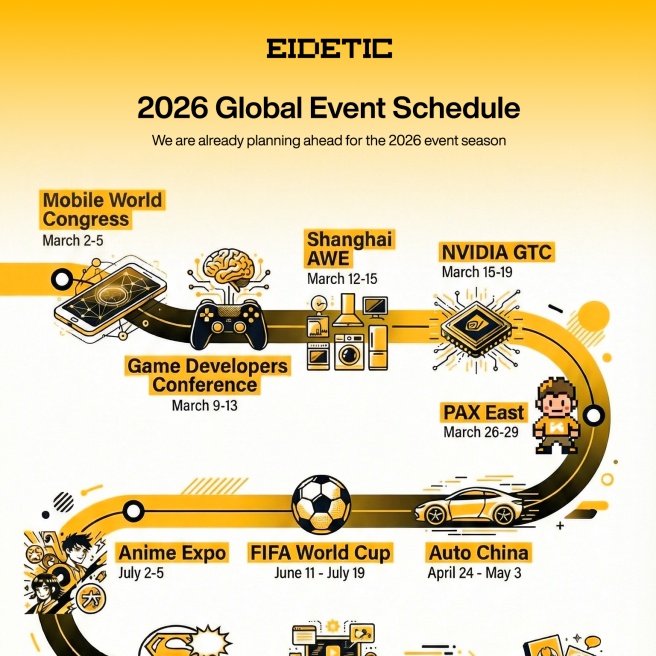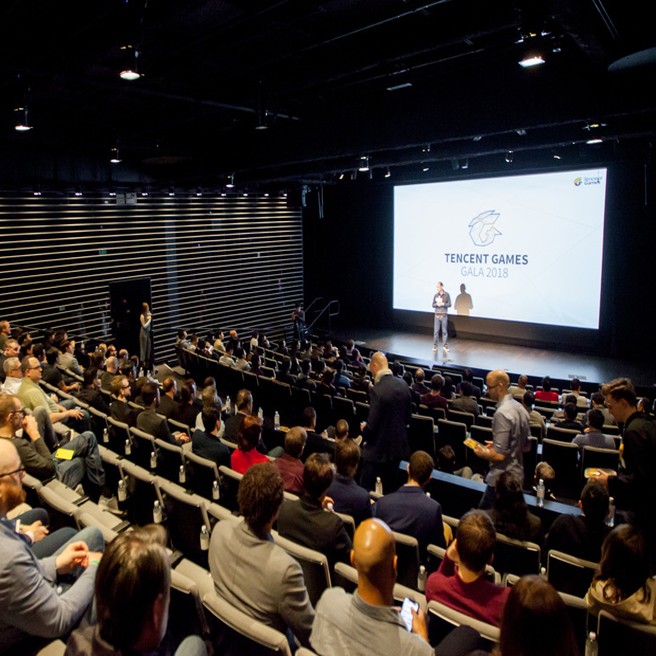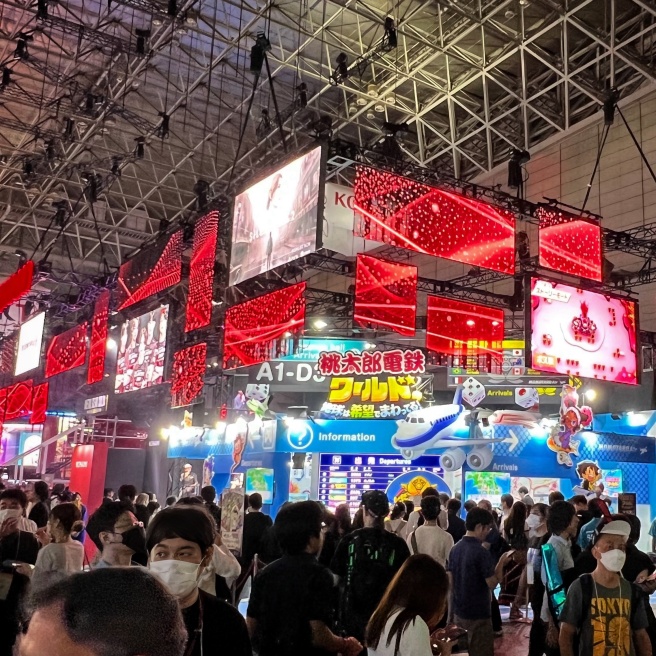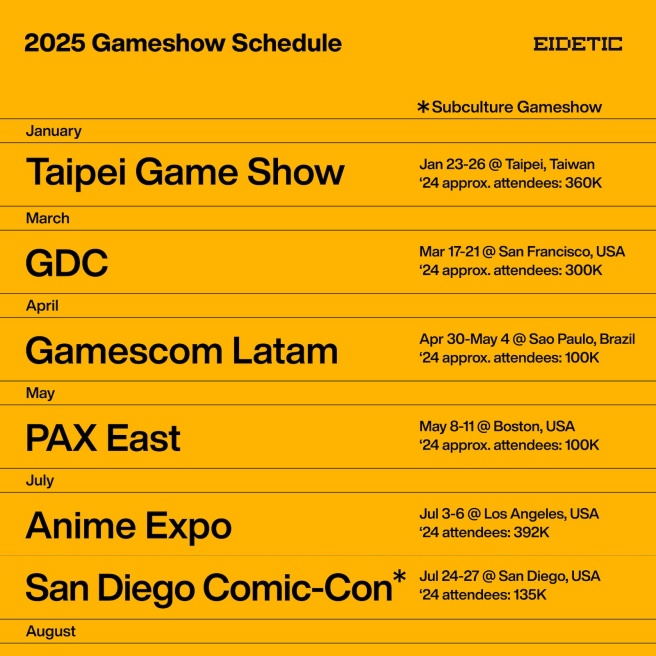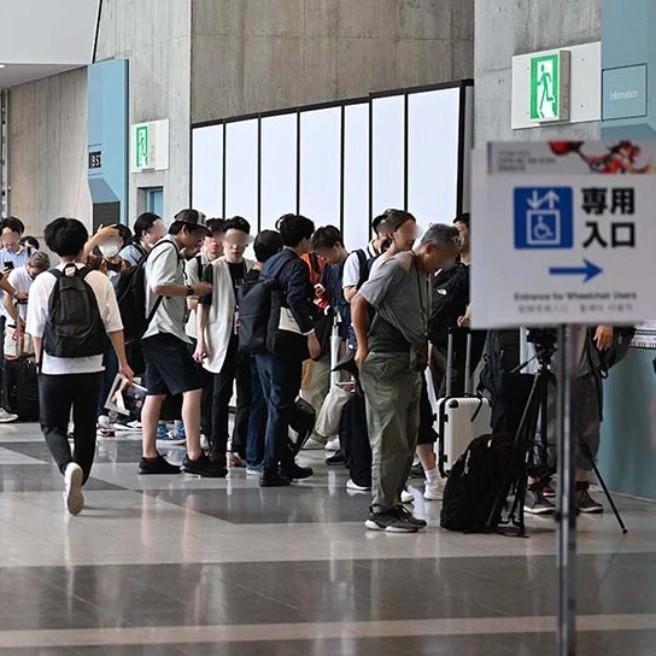
THANK YOU FOR YOUR REQUEST
Thank you very much for your interest in EIDETIC MARKETING.
We look forward to working with you.
We will contact you soon.Thanks Again.

THERE WAS A PROBLEM WITH YOUR SUBMISSION.
Have you checked all the required fields?
We want you to write your Company, Name, E-mail, Budget, Country to Execute, Website URL, Wanted Services and Project Description.Thanks.
Monthly Archives: October 2025
Beauty Exhibitions in Europe: Beauty Düsseldorf, Cosmoprof Bologna, and IMCAS Paris
October 27, 2025
Beauty Exhibitions in Europe
Beauty Düsseldorf, Cosmoprof Bologna, and IMCAS Paris
The global beauty industry thrives on innovation, and beauty exhibitions in Europe have become key stages where new trends, technologies, and partnerships emerge. From skincare and cosmetics to hair, spa, and dermatology, Europe continues to shape the future of global beauty.
Beyond traditional cosmetics, today’s exhibitions also highlight beauty tech solutions such as AI-powered skin analysis, AR/VR makeup experiences, and sustainable packaging innovations. Let’s explore three of the most influential beauty exhibitions in Europe — Beauty Düsseldorf, Cosmoprof Bologna, and IMCAS Paris.

1. Beauty Düsseldorf
- • Location: Düsseldorf, Germany
- • Date: March 28–30, 2025
- • Attendees: 45,000+
- • Exhibitors: 498
- • Brands Represented: 700+
First held in 1995, Beauty Düsseldorf is one of the most established beauty exhibitions in Europe, taking place annually as a B2B event every March. The fair is renowned for its strong professional focus — blending product innovation, training, and business networking across beauty, spa, and wellness sectors.
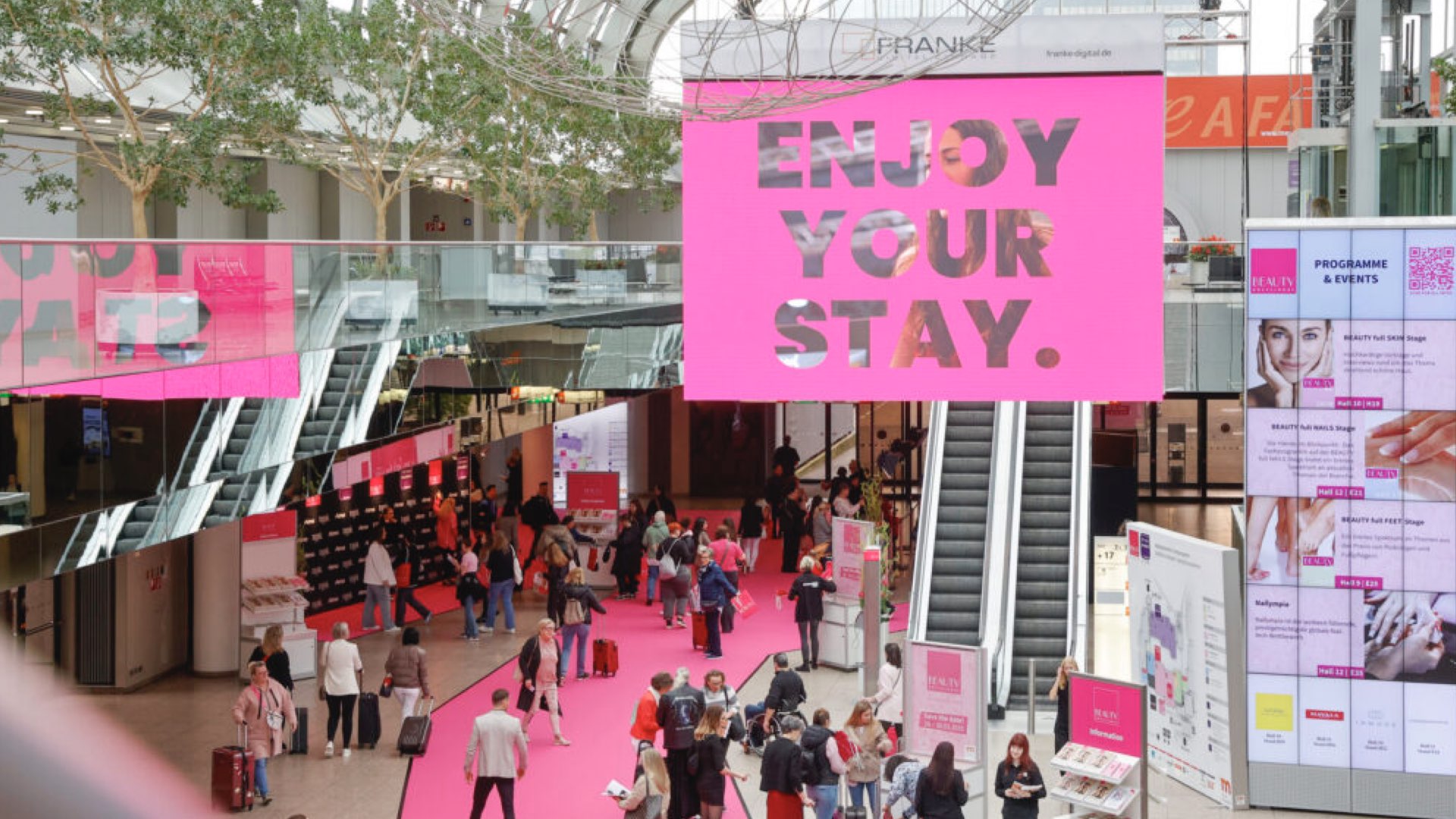
The Messe Düsseldorf venue features 19 halls in total, though only six are dedicated to the beauty fair:
- • Halls 9–11 (pink): Cosmetics section
- Hall 9: Footcare, Wellness & Spa
- Hall 10: Skincare and professional cosmetics
- Hall 11: Color cosmetics, lashes, nails, and permanent makeup
- • Halls 15–17 (purple): Host the Top Hair Düsseldorf show, showcasing haircare, salon tools, and live stage performances.
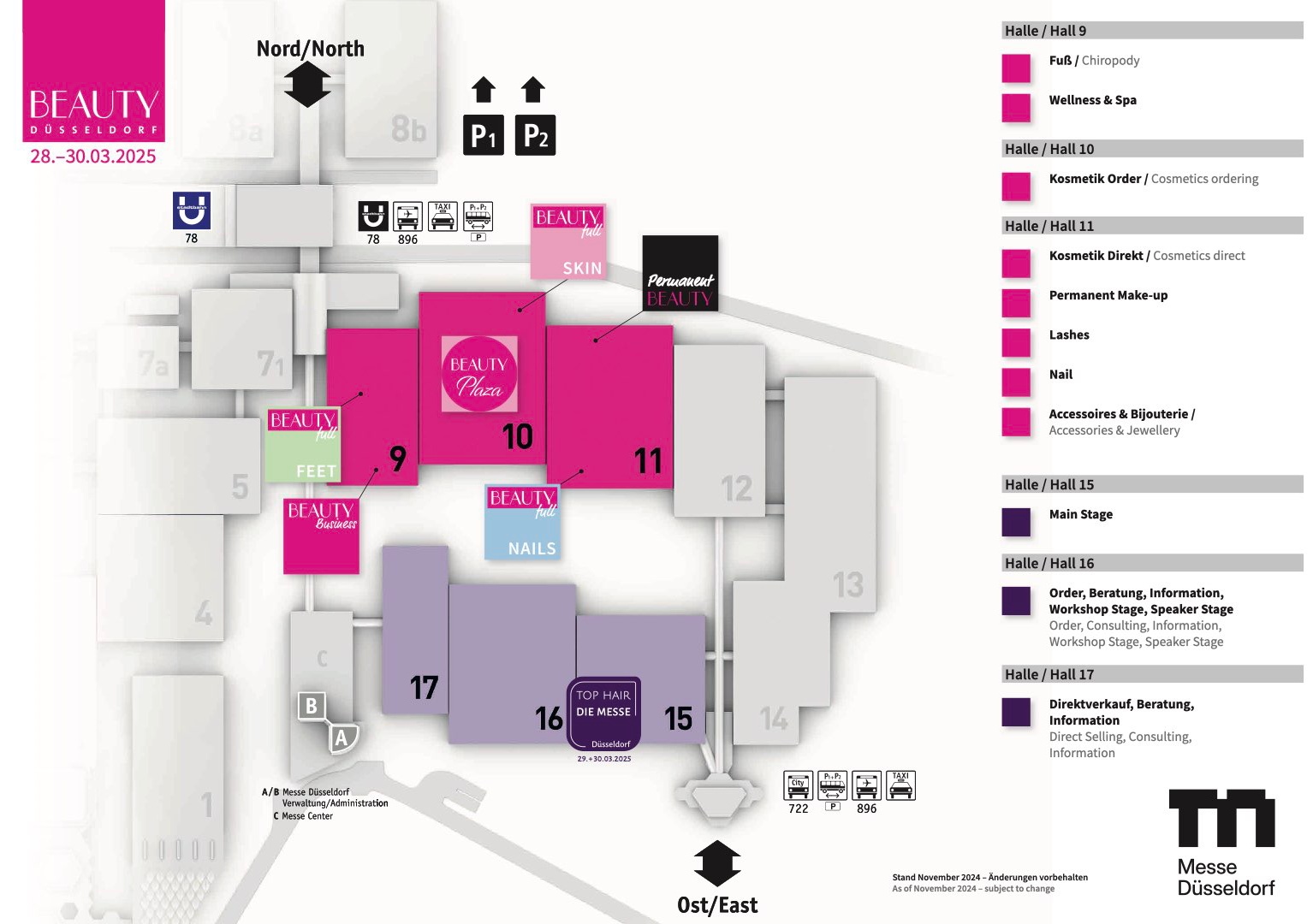
This year, many exhibitors showcased a clear shift toward sustainable beauty and advanced skin health solutions. European clean-beauty pioneers like Weleda and Dr. Hauschka emphasized natural-ingredient innovation, while professional brands such as Wella Professionals and L’Oréal Professionnel highlighted the latest hair-tool technologies in the Top Hair segment.
2. Cosmoprof Bologna
- • Location: Bologna, Italy
- • Date: March 20–23, 2025
- • Attendees: 255,000+
- • Exhibitors: 3,100+
- • Brands Represented: 10,000+
Since 1967, Cosmoprof Bologna has stood as one of the largest and most globally recognized beauty exhibitions in Europe. It brings together brands, manufacturers, and distributors from all corners of the industry — covering everything from cosmetics and packaging to spa and salon solutions.
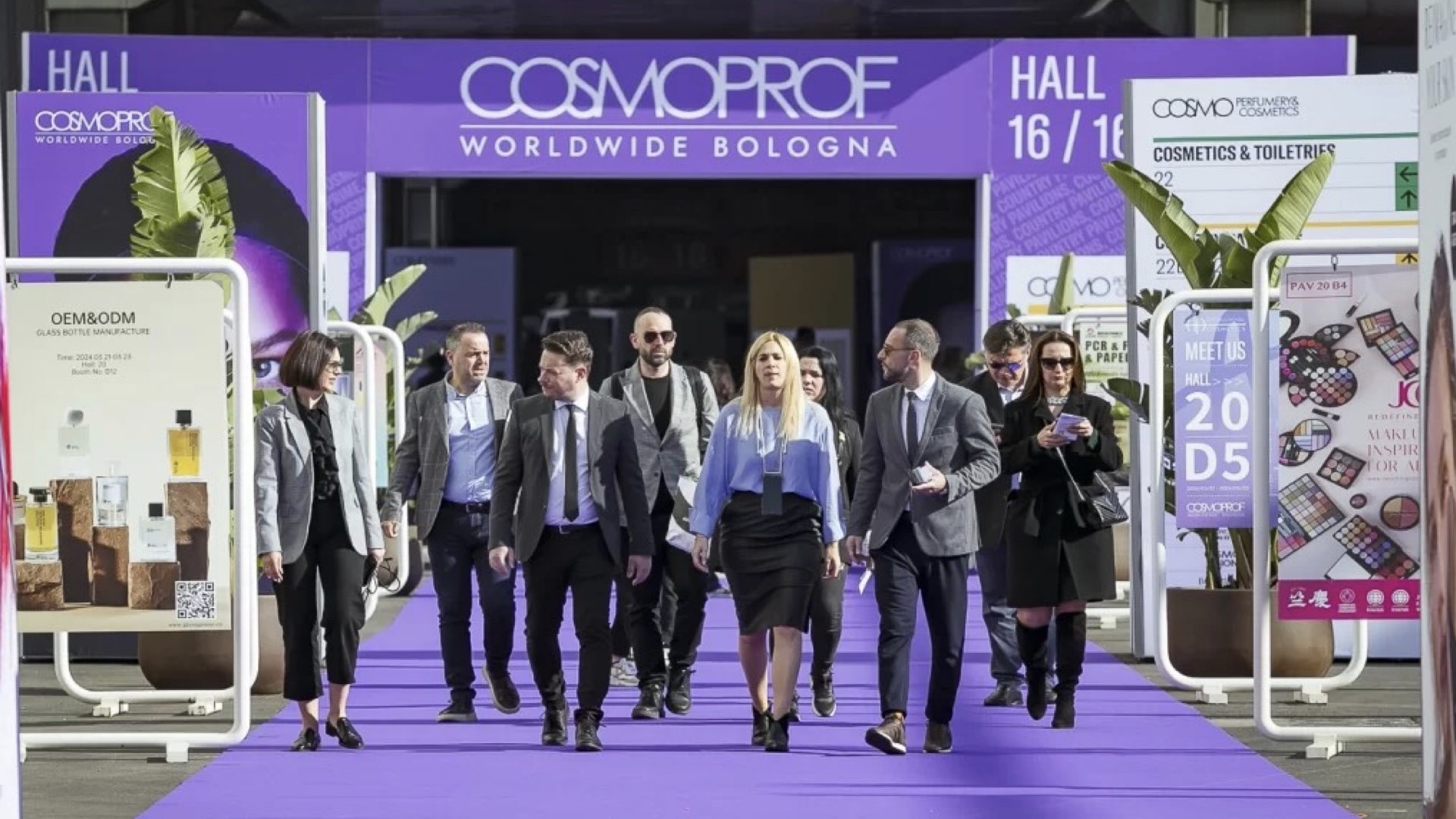
The BolognaFiere venue includes nearly 20 halls, most fully occupied during Cosmoprof. The fair is organized into three key thematic areas:
- COSMOPACK (pink): Raw materials, private label manufacturing, and packaging innovation
- COSMO Perfumery & Cosmetics (green/brown): Skincare, cosmetics, and international pavilions
- COSMO Hair, Nail & Beauty Salon (blue): Professional hair, nail, and beauty salon products
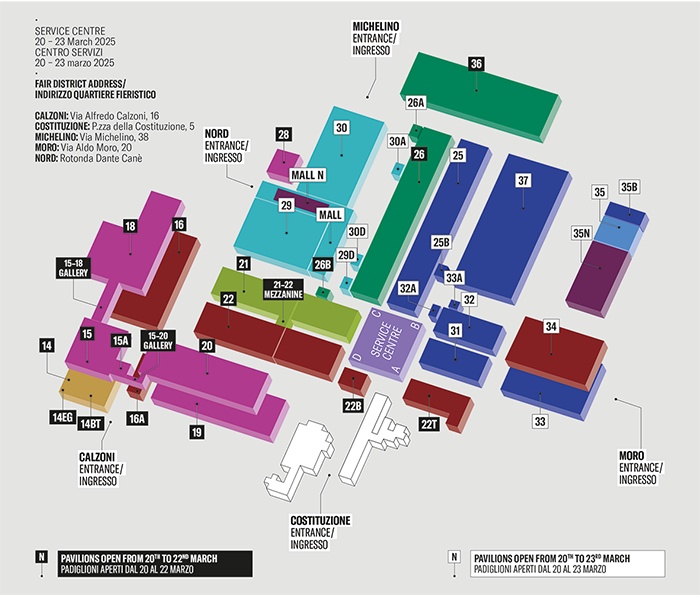
The 2025 edition placed strong emphasis on innovation and sustainability. Brands such as Lumson, Intercos, and Suntribe introduced eco-smart packaging and skin-friendly formulations, while luxury players like L’Oréal, Shiseido, and Coty explored “skinification of makeup” — merging skincare benefits with color products. Across the fair, “green chemistry” and “AI-driven personalization” emerged as defining trends of this year’s edition.
Because Cosmoprof Bologna takes place just weeks apart from Beauty Düsseldorf, many exhibitors strategically participate in both events to maximize their European visibility. This overlap effectively creates a “European beauty season,” where global brands launch new collections in Düsseldorf and reinforce their presence in Bologna — making March one of the most dynamic months on the international beauty calendar.
3. IMCAS Paris
- • Location: Paris, France
- • Date: January 30 – February 1, 2025
- • Attendees: 20,000+
- • Exhibitors: 370+
- • Brands Represented: 500+
Unlike other beauty exhibitions in Europe, IMCAS Paris bridges science and aesthetics. Founded in 1998, IMCAS — the International Master Course on Aging Science — serves as both a medical congress and aesthetic exhibition, bringing together dermatologists, plastic surgeons, and medical beauty professionals from around the world.
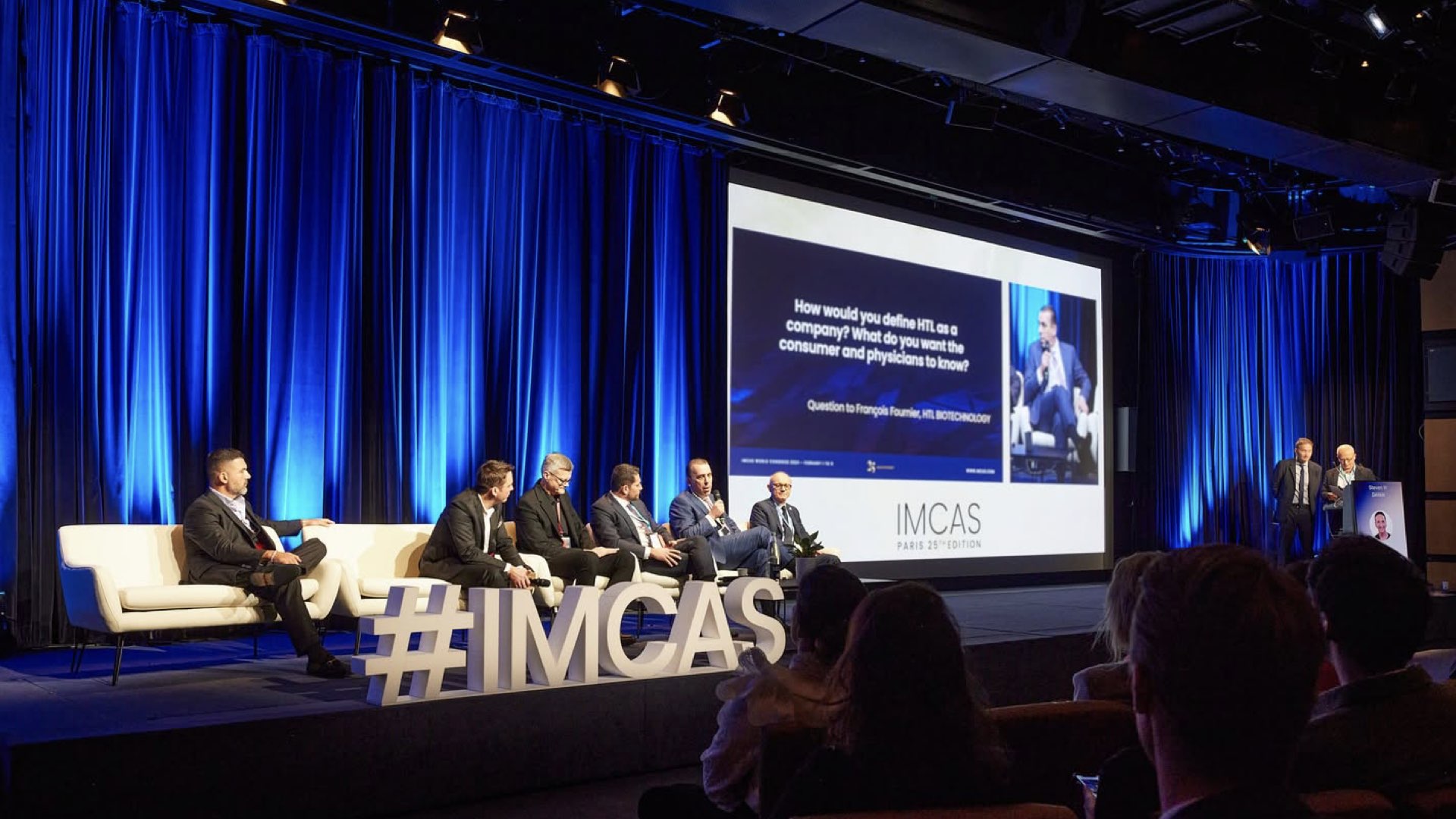
Held at the Palais des Congrès de Paris, IMCAS features extensive exhibition halls, live demonstrations, and scientific lectures on anti-aging, injectables, and laser technologies. This year’s event highlighted the rise of regenerative aesthetics, with global leaders like Prollenium, SkinPen, and Merz Aesthetics unveiling next-generation solutions for skin renewal and collagen stimulation. The intersection of clinical research and cosmetic innovation clearly defined the direction of this year’s show.
Creating Beauty Experiences
From professional events like Beauty Düsseldorf to cross-sector giants such as Cosmoprof Bologna, and medical-aesthetic congresses like IMCAS Paris, Europe continues to lead global beauty innovation.
These exhibitions are more than showcases. They are where brand identity, storytelling, and market positioning come alive through engaging, in-person experiences.
At Eidetic Marketing, we help beauty and lifestyle brands turn their vision into powerful, memorable moments on the global stage.
Our expertise covers every stage of the journey — from brand strategy and exhibition marketing to PR and influencer partnerships that expand visibility beyond the show floor.
Importantly, success at European exhibitions isn’t just about building a booth. It’s about crafting a cohesive brand experience that connects with people across cultures and markets.
With our integrated marketing approach, your brand can stand out — visibly, emotionally, and strategically — at every major beauty event in Europe.
Explore More Our Portfolios
All About New York Comic Con Exhibitors 2025
October 20, 2025
All About New York Comic Con Exhibitors 2025
What Is NYCC 2025?
New York Comic Con 2025 (NYCC 2025) took place from October 12–19 at the Jacob K. Javits Center in New York City, drawing an estimated 250,000 attendees and over 1,300 exhibitors.
The event once again proved why NYCC remains one of the most influential pop-culture conventions in the world—bridging comics, gaming, animation, film, and an expanding lineup of lifestyle and tech brands.
If San Diego Comic-Con (SDCC) anchors pop culture on the West Coast, NYCC serves as its East Coast counterpart—delivering the same creative energy through a broader mix of global content and brand activations.
This year’s show floor reflected that perfectly, balancing iconic IP showcases with new forms of brand participation.
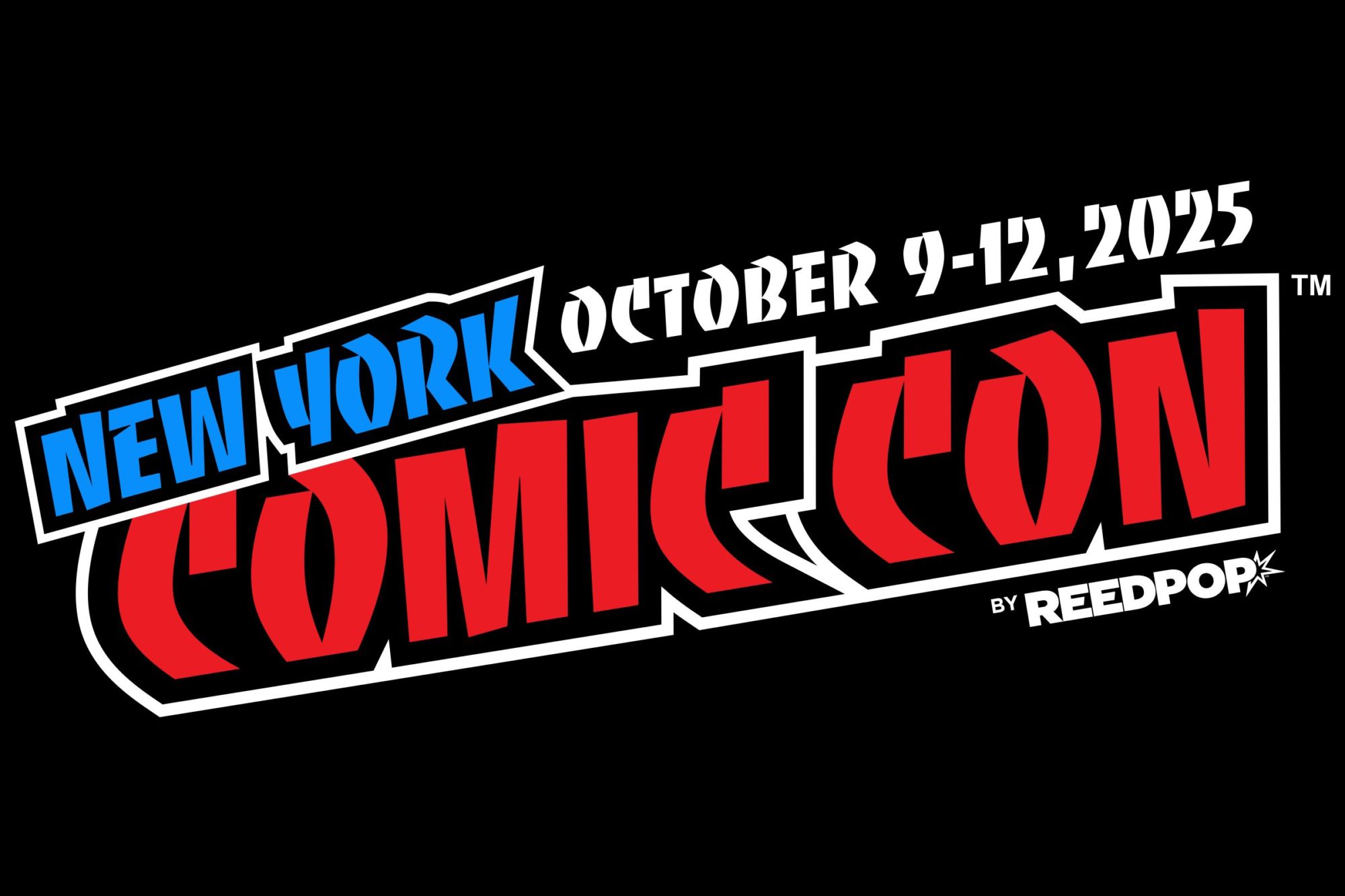
Inside the Show Floor: Exhibitors That Shaped NYCC 2025
More than 1,300 companies and artists filled the Javits Center this year.
Long-time staples like Marvel, Bandai Namco, Crunchyroll, Capcom, Viz Media, and Funko returned with bigger, more interactive booths.
Their presence kept the main halls packed from morning to evening.
What stood out this year was the rise of non-entertainment brands.
Walmart, Duolingo, Loungefly, Penguin Random House, and NECA joined the lineup—bringing retail, lifestyle, and educational experiences into the mix.
The show floor felt broader and more dynamic than ever.
Many exhibitors focused less on products and more on interaction.
Fans could play demos, take photos, join live challenges, or grab exclusive collaborations.
The result was a floor that felt like an ecosystem of experiences—showing that fandom today is driven by participation, not just viewing.
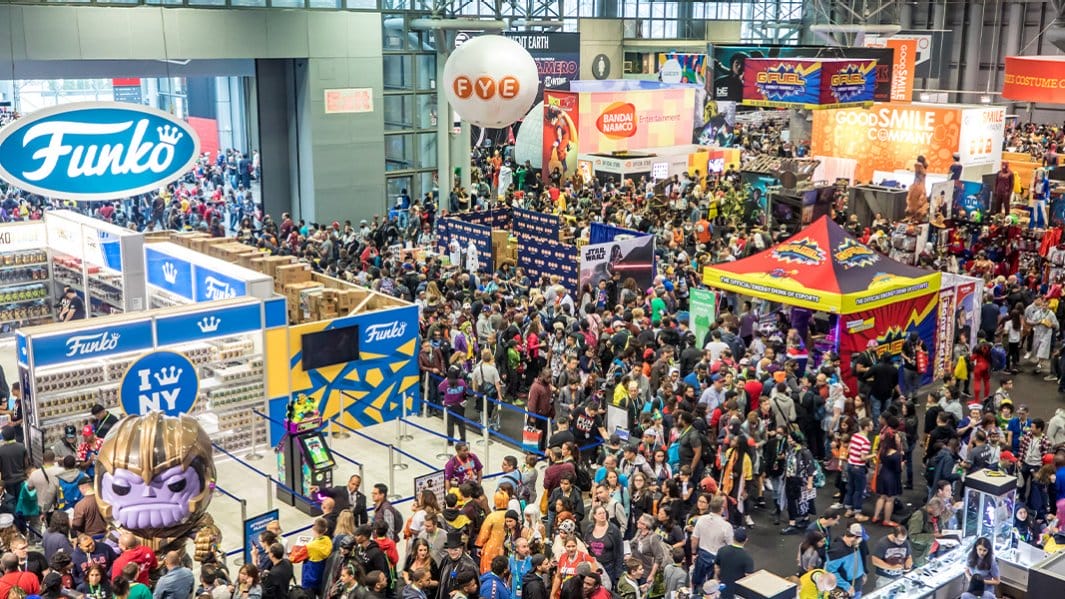
NYCC 2025 Highlights
Marvel
Marvel anchored the center of the show floor with one of the largest booths at the Javits Center.
Across four days, the brand hosted exclusive panels for upcoming animated titles including Your Friendly Neighborhood Spider-Man, Eyes of Wakanda, and X-Men ’97.
Life-size character displays and limited-edition Marvel Animation merchandise made it one of the busiest destinations throughout the weekend.
Crunchyroll
Crunchyroll turned heads with its Gachiakuta-themed Dumpster-diving challenge.
Fans raced against the clock to find branded “trash” items that could be exchanged for prizes—a lighthearted activation that quickly became one of the most talked-about experiences at the convention.
Toei Animation
Toei Animation brought One Piece to life through a large-scale immersive exhibition in collaboration with Mercer Labs.
The multiroom installation blended digital projection, light, and sound to guide visitors through key storylines—an ambitious setup that resonated with both new fans and long-time followers.
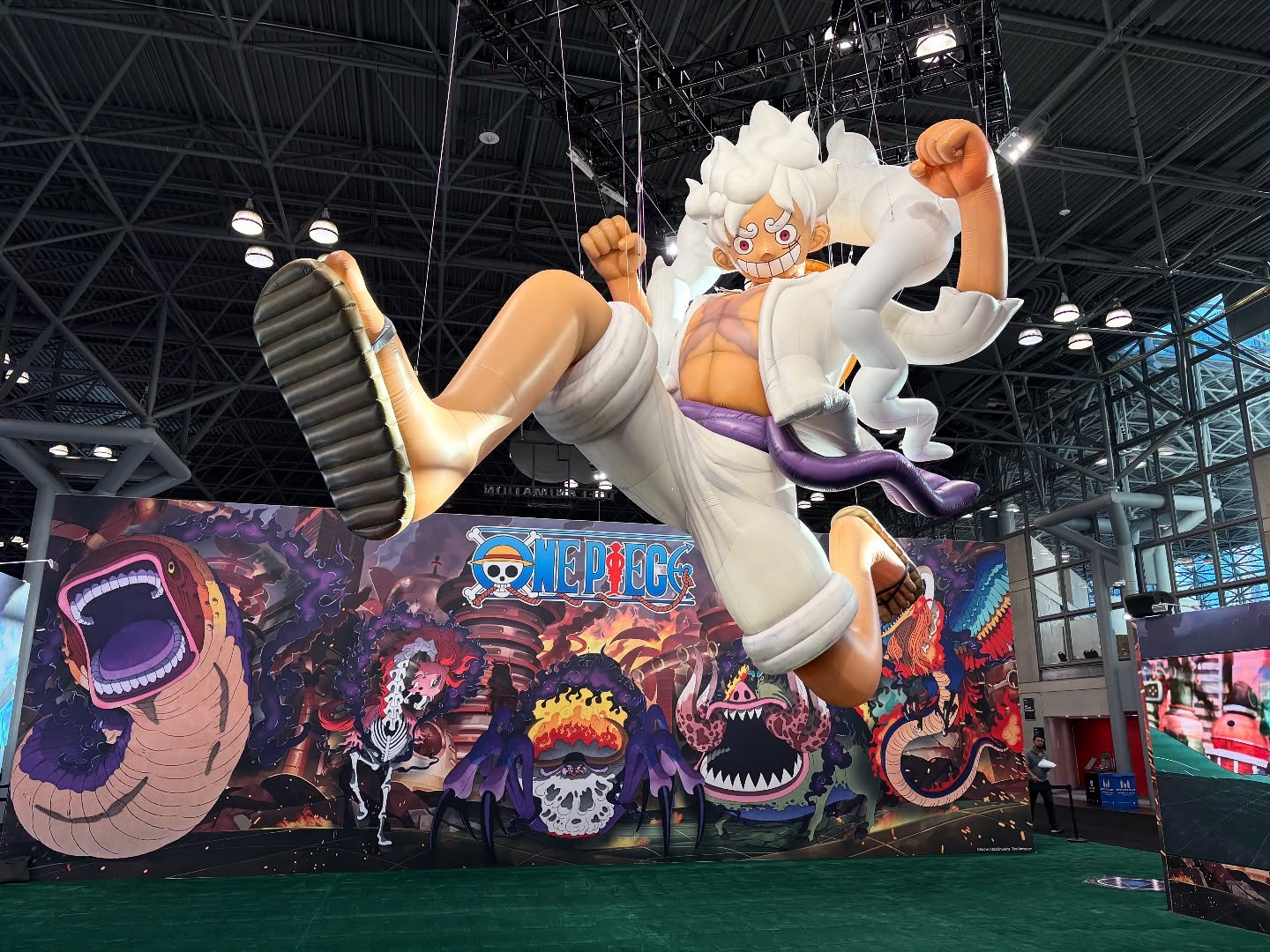
Bandai Namco Entertainment
Bandai Namco spotlighted its collectibles and model-kit portfolio, including Tamashii Nations, Dragon Ball, Gunpla, and One Piece lines.
Collectors lined up early each day for exclusive figures and new releases, while gaming titles like Tekken 8 and Sand Land were featured through display visuals.
The booth bridged gaming IP with collectibles, solidifying Bandai Namco’s position at the center of anime merchandising.
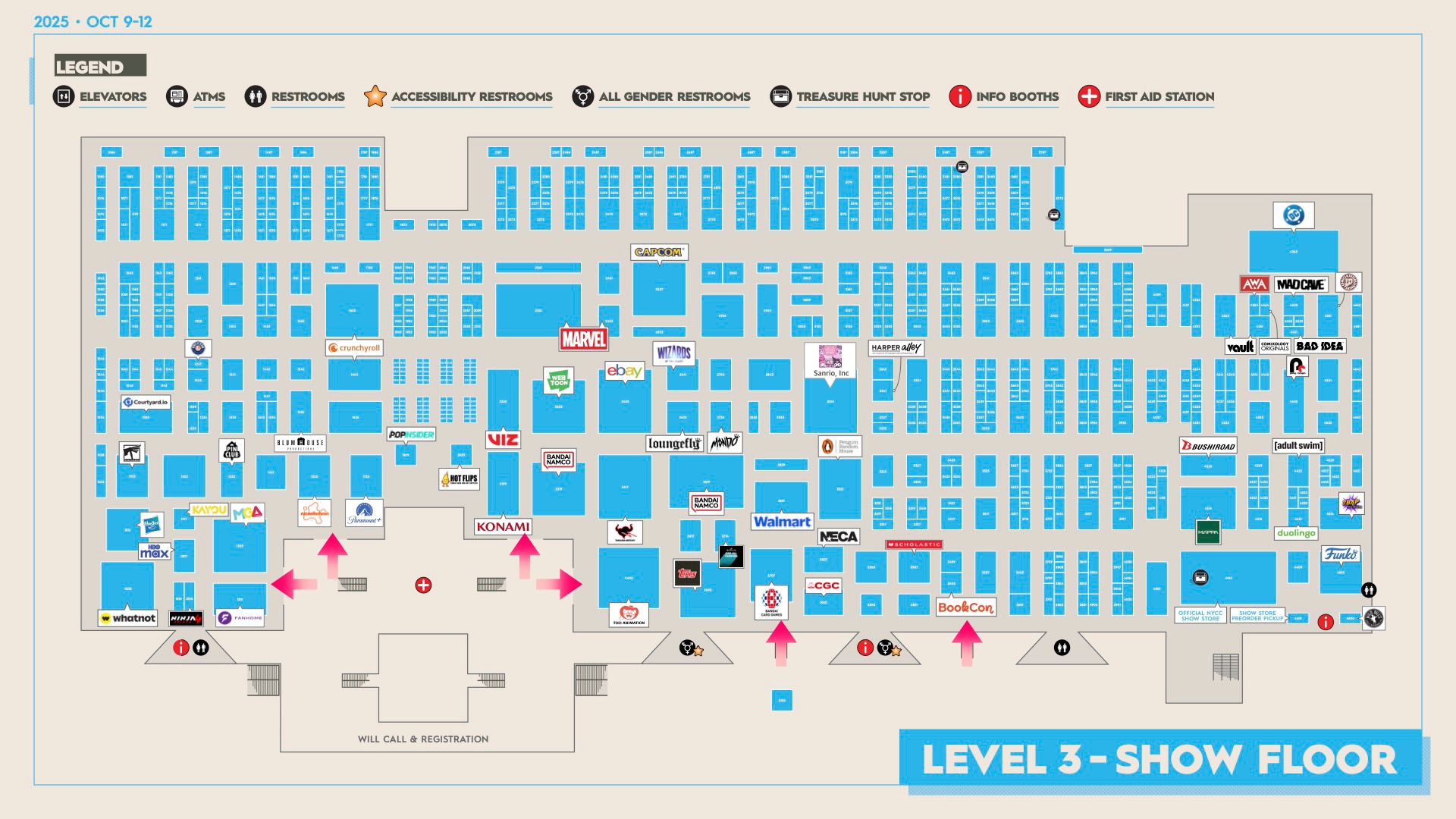
Beyond Entertainment: Expanding the Brand Spectrum
Outside the entertainment and gaming giants, NYCC 2025 introduced brands from new categories.
eBay and Walmart leaned into the collector economy with retail-style booths and exclusive drops.
Loungefly showcased pop-culture-inspired bags and accessories with on-site customization.
Duolingo turned heads with a playful booth featuring its mascot, trivia games, and exclusive merch.
Penguin Random House hosted book signings and graphic novel showcases that connected publishing with fandom.
These brands proved that Comic Con isn’t just for entertainment IPs.
It’s a space where retail, education, and lifestyle brands meet fans through shared passion and creativity.

New York Comic Con Marketing Agency
At Eidetic Marketing, we work with global gaming and entertainment brands to create experiences that connect fans and IPs across major conventions worldwide.
Our team has produced brand activations and exhibition campaigns at events such as Gamescom, Anime Expo, San Diego Comic-Con, and ChinaJoy, building a track record in bringing fandom and brand storytelling together.
Tokyo Game Show 2025: Exploring The Most Popular Booths
October 7, 2025
Tokyo Game Show 2025
Exploring The Most Popular Booths
The Tokyo Game Show 2025 closed its four-day run at Makuhari Messe with over 263,000 visitors. Beyond sheer scale, this year’s show was defined by how major publishers transformed their booths into living brand experiences—a shift from spectacle to strategy.
If you missed our first coverage on booth trends and overall highlights, read it here: Tokyo Game Show 2025: Big Booth Highlights.
Here’s how each Tokyo Game Show popular booth earned the spotlight.
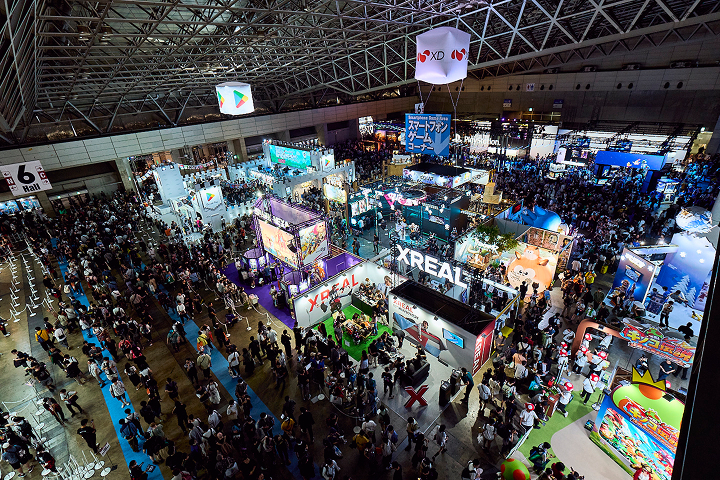
Square Enix
Square Enix’s booth at Hall 3 – S02 was designed as a multi-sensory stage experience rather than a static showcase. Every major title—from Dragon Quest I & II HD-2D Remake to Final Fantasy VII Remake Intergrade and Final Fantasy XIV Online—had its own interactive zone, blending physical rewards, fan engagement, and live broadcasts.
Highlights:
- ✔️ Dragon Quest I & II HD-2D Remake: 15-minute demo + limited-edition drink giveaway + life-size Dragonlord photo zone.
- ✔️ Final Fantasy VII Remake Intergrade: Magic: The Gathering crossover photo wall + collectible card cases.
- ✔️ Final Fantasy XIV Online: Mascot meet-and-greet + social media-linked campaigns (Instagram, KakaoTalk, Bluesky).
- ✔️ Final Fantasy Tactics: The Ivalice Chronicle and Octopath Traveler 0: Developer Q&A sessions, voice actor appearances, and live streaming.
Square Enix emphasized hybrid experiences—real-time livestreams, influencer-hosted talks, and on-site giveaways—that deepened both digital and physical participation.
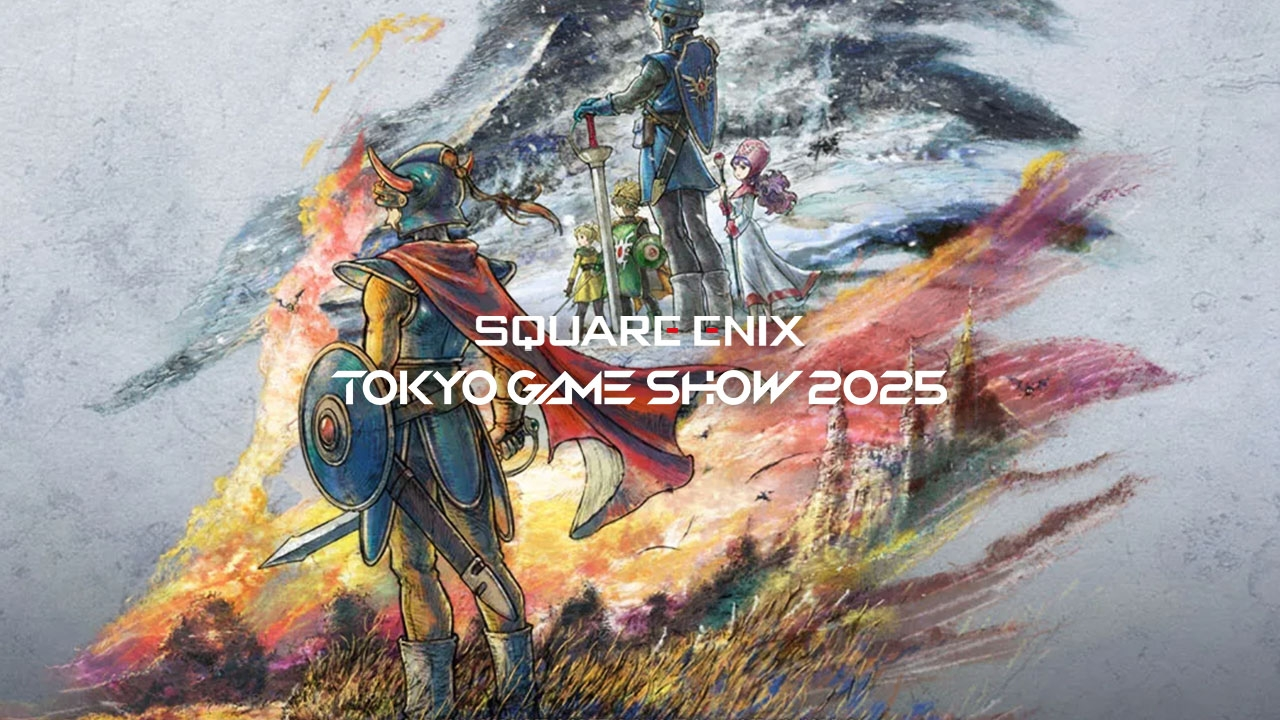
Capcom
Few publishers understood fan psychology as well as Capcom. Its Hall 7 – S02 booth became a magnet for players eager to test next-gen titles hands-on. It hosted full-scale demo zones for Monster Hunter Outlanders, Monster Hunter Stories 3, and Monster Hunter Wilds, playable across PS5, Switch 2, and mobile. Visitors received limited-edition Monster Hunter gear, with additional prizes through the #MHWilds Instagram challenge.
The booth also featured Pragmata and Onimusha: The Path of Blades, with developer Q&A streams and exclusive art exhibitions. Resident Evil Requiem and Survival Unit transformed the space into horror-themed VR environments with survival challenges and live mission events. Street Fighter 6 drew massive crowds for live tournaments and influencer-led battles.
SEGA / ATLUS
SEGA/ATLUS embraced nostalgia and energy at Hall 4 – N06, turning gameplay into performance and fans into part of the show. The booth layout felt like a theme park—part racing circuit, part arcade, part fan stage.
Highlights:
- ✔️ Sonic Racing CrossWorlds: Life-size F1 car + leaderboard challenge with instant prizes.
- ✔️ Virtua Fighter R.E.V.O.: eSports Park collaboration with live influencer commentary.
- ✔️ Persona 3 Reload: AR/VR dungeon experience + café coupon rewards + fan art and merchandise zone.
With the “Fun Time Show” panel, SEGA turned influencers and cosplayers into content hosts, encouraging audience participation and real-time engagement.
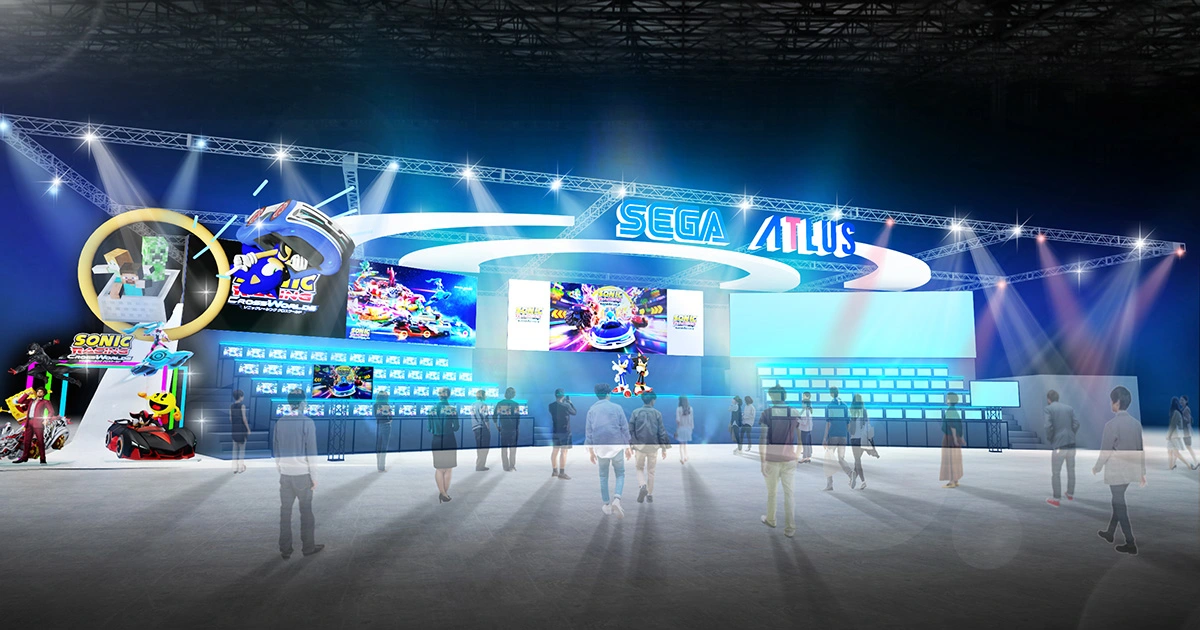
Bandai Namco
Located in Hall 6 – N06, Bandai Namco focused on immersive storytelling over size. Four major IPs—Code Vein II, Digimon Story: Time Stranger, Little Nightmares III, and Once Upon a Katamari—each had distinct narrative-driven zones.
From Little Nightmares III’s atmospheric cosplay photo contest to Once Upon a Katamari’s giant playable sculpture, every corner encouraged interaction. The Family Game Park & Tamagotchi Plaza invited families to experience casual and educational titles together, reinforcing inclusivity as part of Bandai’s identity.
Konami
Konami’s expansive booth at Hall 5 – S01 offered over 40 playable titles, from Metal Gear Solid Δ: Snake Eater and Silent Hill f to Momotaro Dentetsu 2 and Suikoden Star Leap.
Each major title had its own stage program: Metal Gear Production Hotline with the dev team, Silent Hill Live Commentary with 2BRO., and esports finals for eBASEBALL Power Pros. The space also included VR Idol showcases, live DJ sessions, and the Indie Student Challenge awards ceremony.
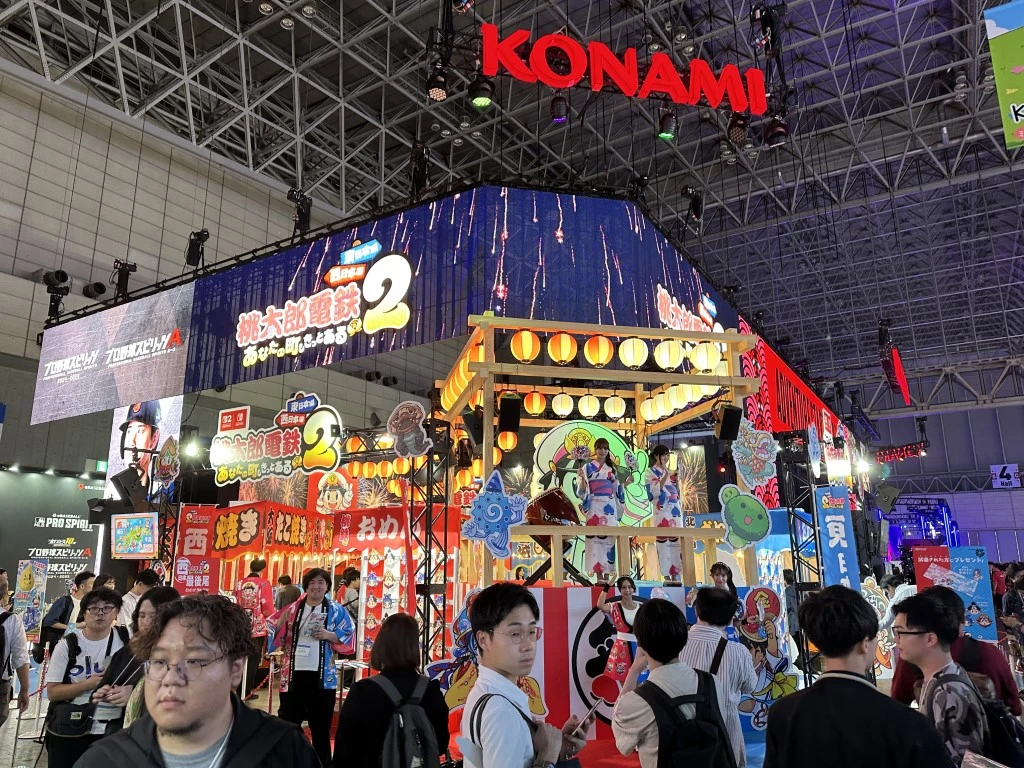
Sony Interactive Entertainment
At Hall 4 – S01, Sony presented itself not as a game publisher but as a platform experience curator. The booth emphasized Ghost of Yōtei, MARVEL Tokon: Fighting Souls, and Astro Bot, each tailored to distinct audiences.
Highlights:
- ✔️ Ghost of Yōtei: 30-minute demo and live developer Q&A.
- ✔️ MARVEL Tokon: Fighting Souls: Pro-gamer battles + cosplay photo stage + livestreamed stage show.
- ✔️ Astro Bot: Family-focused AR mini-games and stamp tours with collectible figures.
Sony also celebrated PlayStation’s 30th anniversary with a YOASOBI collaboration—Project: Memory Card—featuring limited-edition art and giveaways. PlayStation Plus members enjoyed exclusive pre-booked demos and merchandise kits.
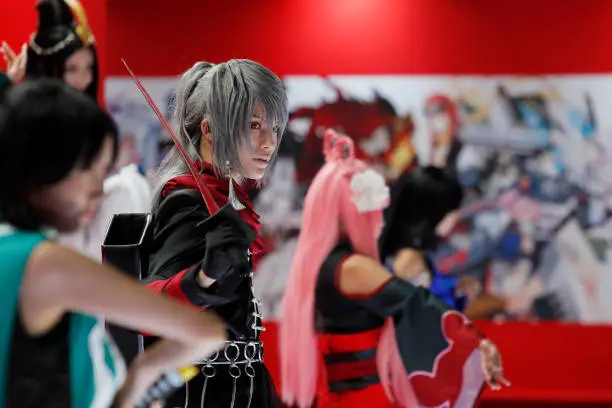
Tokyo Game Show Marketing Agency
Over the past few years, Tokyo Game Show has evolved into Asia’s answer to Gamescom—a hub where global publishers, developers, and creators converge to enter or expand across Asian markets.
The surge in exhibitor participation and media attention shows that TGS is now the fastest-growing global gaming exhibition, perfectly positioned as the gateway to Asia’s players and partners.
At Eidetic Marketing, we help brands turn this momentum into measurable impact.
From booth concept and design to full-scale execution and on-site management, our team bridges creativity and precision to deliver experiences that move audiences and elevate brand presence.
If your goal is to make a statement at Tokyo Game Show 2026, we’re here to help you craft a booth that connects, converts, and captivates.
Sources
On-site analysis and reporting by Eidetic Marketing
Gematsu — Capcom TGS 2025 lineup announcement
Tokyo Game Show 2025 Official Site
GamerBraves — Event overview and exhibitor coverage
Frontline Japan — Image references and booth visuals
GamerBraves — Event overview and exhibitor coverage



